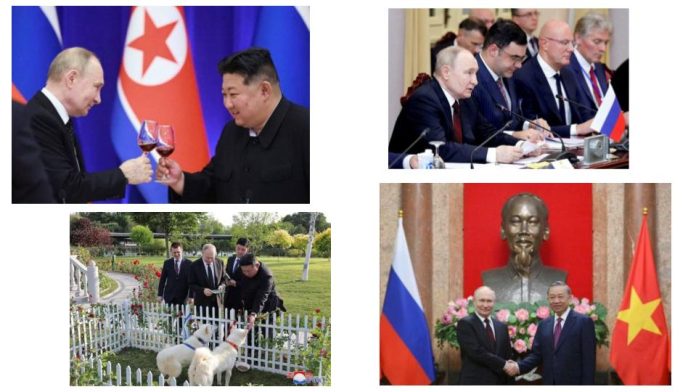Russian President Vladimir Putin wrapped up a significant diplomatic tour of Asia on Thursday, visiting Vietnam after a landmark trip to North Korea. The visits, seen as a show of defiance against Western isolation, have drawn attention and criticism from the United States and its allies.
In Pyongyang on Wednesday, Putin was greeted with fanfare as he and North Korean leader Kim Jong Un signed an agreement elevating their countries’ relationship to a “comprehensive strategic partnership.” The visit marked Putin’s first to North Korea in 24 years and is expected to reshape decades of Russia-North Korea relations.
Kim expressed “unconditional support” for Russia’s policies, including its war in Ukraine. The two leaders exchanged gifts, with Putin presenting Kim with a Russian-built Aurus limousine, a tea set, and an admiral’s dirk. In return, Putin received various works of art depicting himself.
Russia’s policies
Moving on to Vietnam on Thursday, Putin was welcomed with a 21-gun salute and embraced by Vietnamese leaders. He emphasized Russia’s commitment to deepening ties with Vietnam, signing agreements on energy and security cooperation. Putin expressed interest in building a “reliable security architecture” in the Asia-Pacific region.
The Russian leader’s warm reception in Hanoi has been seen as a diplomatic win, particularly given Vietnam’s efforts to maintain a neutral foreign policy amid major world powers. Vietnam has abstained from condemning Russia’s actions in Ukraine, a stance that has drawn scrutiny from Western nations.
Putin’s Asia tour highlights Russia’s pivot towards Asian partnerships following Western sanctions over the Ukraine conflict. In Vietnam, he discussed potential long-term supplies of liquefied natural gas (LNG) and continued cooperation in the oil and gas sector.
The United States and the European Union have criticized Vietnam’s hosting of Putin. However, analysts suggest that Hanoi may have correctly calculated it will not face significant consequences for the visit.

